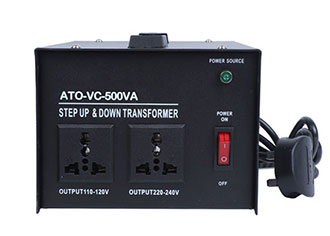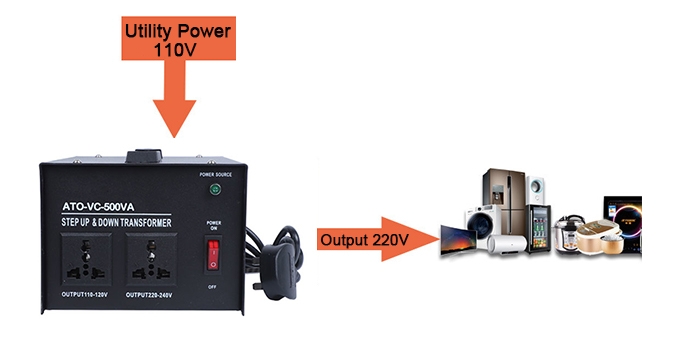Voltage converters, as an important component in electronic circuits, have many significant advantages, and voltage converters play a key role in various applications. Voltage converters enable efficient utilization of electrical energy. In power systems, voltage often needs to be converted from one level to another to accommodate the needs of different devices. Voltage converters can reduce high voltages to a level suitable for household use or raise low voltages for use by industrial equipment. In this way, voltage converters help to reduce the wastage of power and increase the efficiency of energy utilization.
Voltage converters can stabilize the power supply. Voltage fluctuations are unavoidable in power grids, but for many devices, a stable supply voltage is critical. Voltage converters can stabilize the power supply by monitoring the input voltage and adjusting the output voltage to ensure proper operation of the equipment. Inverter. com will explore the benefits of voltage converters and the importance of voltage converters in different fields.
Core Advantages of Voltage Converters
1. Efficient Energy Utilization and Conservation. In an era of increasing energy scarcity, the primary advantage of voltage converters is their ability to efficiently utilize electricity. Whether lowering high-voltage power from the grid to safe levels for household appliances or stepping up low-voltage DC to meet industrial equipment requirements, voltage converters precisely regulate power, minimizing energy loss during conversion and improving overall efficiency. Additionally, advanced voltage converters feature energy-saving designs, such as smart power output adjustments and reduced idle losses, further reducing energy consumption and promoting sustainable development.
2. Guardians of Stable Power Supply. Voltage fluctuations in power grids can significantly impact the stable operation of equipment. Voltage converters, equipped with built-in monitoring and regulation mechanisms, can detect input voltage changes in real time and swiftly adjust the output voltage to a preset stable value, effectively shielding equipment from voltage surges. This ability to provide a stable power supply is crucial for the reliable operation of precision instruments, communication devices, medical equipment, and other critical systems, reducing the risk of equipment failure and downtime due to unstable voltage.
3. Wide Power Adaptability. Another key advantage of voltage converters is their wide power adaptability. Different countries and regions have varying power voltage standards, and voltage converters can easily handle these differences, converting any input voltage to the required level for the device. This adaptability not only enhances the global compatibility of devices but also offers great convenience for multinational businesses and travelers.
Applications of Voltage Converters in Specific Fields
- The Stable Foundation of the Telecom Industry
In the telecommunications industry, the importance of voltage converters cannot be overstated. Communication equipment requires high-quality power, as even minor voltage fluctuations can lead to service interruptions or data loss. Voltage converters ensure a stable and reliable power supply, supporting the smooth operation of communication networks and secure data transmission.
- The Cornerstone of Industrial Automation and Smart Manufacturing
In industrial automation systems, voltage converters play a pivotal role in ensuring the smooth operation of various devices. From robotic arms on production lines to computer servers in control centers, stable and precise power is essential. Voltage converters provide flexible voltage regulation, ensuring the smooth operation of the entire production line, thereby enhancing production efficiency and product quality.
- Driving Innovation in Renewable Energy
In renewable energy, voltage converters play an irreplaceable role. Natural energy sources like solar and wind power are intermittent and unstable, and the electricity they generate must be processed by voltage converters to be transformed into stable, reliable power for grid usage or storage. As renewable energy technologies continue to advance, voltage converters are also evolving to meet the demands of larger-scale, more efficient energy conversion.
- Popularization of Mobile and Portable Devices
In the realm of mobile devices, the widespread use of voltage converters has significantly promoted global connectivity. Devices like smartphones, tablets, and laptops all rely on stable power supplies. Voltage converters, known for their compact size and high conversion efficiency, have become essential for international travelers, solving the charging challenges caused by varying voltage standards. The affordable 1000W voltage converter for sale at Inverter.com is made of high-quality materials and can switch between 110V AC or 220V AC input voltage at will, making it suitable for worldwide travel.
- Ensuring Safety in Medical Equipment
Medical equipment is directly tied to patient safety, so it demands extremely high-quality power. Voltage converters provide stable and precise power, ensuring the normal operation of medical equipment during surgeries, diagnoses, and treatments. Their use in healthcare enhances the reliability and safety of devices while offering healthcare professionals more efficient and convenient tools for diagnosis and treatment.

As technology continues to evolve, voltage converters will demonstrate their unique value in even more fields. With the rise of smart grids, the Internet of Things (IoT), and new energy vehicles, voltage converters will face more complex and diverse demands. Simultaneously, advancements in material science and microelectronics will further enhance the performance of voltage converters, pushing their efficiency, stability, and reliability to unprecedented levels.
In summary, voltage converters, as crucial components in electronic circuits, possess significant advantages and are widely applicable. As technological development progresses, voltage converters will continue to play an irreplaceable role, driving progress and growth across various industries.
